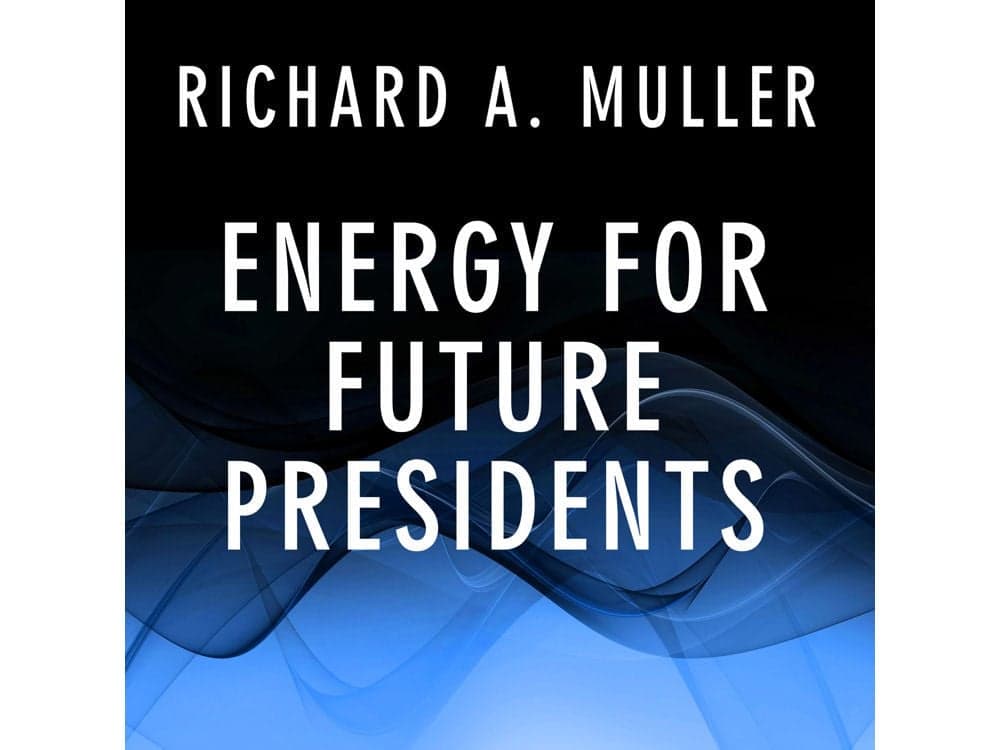(For an introduction to this E3 blog series click here)
Professor Richard Muller of the University of California, Berkley, a PhD in physics, wrote a fascinating book in 2012, Energy for Future Presidents: The Science Behind the Headlines. He wrote it as if it were a memo to the next president. Though written for the 2012 presidency, bottom line, it stands the test of time and is still a good read for the next president, assuming the president also reads my critiques of some of the conclusions.
I just found the book but I wish I had found it sooner. Several things are fascinating.
First, the book is comprehensive in its discussion of current energy policy issues. He is remarkably lucid considering the complexity of the subject matter. To be completely honest, I learned a lot about the underlying physics of energy that will prove helpful in making future E3 policy recommendations.
Second, four years have passed so we have more information now than Professor Muller had. But he was remarkably prescient in his insights about many energy issues. For example, fracking for oil shale was in its infancy, while fracking for natural gas was going gang busters. He correctly predicted that if fracking for oil shale played out it would radically change global dynamics related to energy as well as foreign policy. He even predicted that it could mean the end of OPEC. I am ready to concede that he is correct on this one.
Third, he predicates much of his analysis of energy on two issues: oil security and climate change. I call each of these issues a Golden Thread. If his Threads are correct, his recommendations create an elegant garment. But if you pull both of the Golden Threads from the garment, it unravels into rags. Future blog postings will discuss these Golden Threads and the attendant recommendations. Since I disagree with the importance of the Golden Threads, much of my analysis will be critical of an otherwise very insightful book.
Fourth, I highly recommend the book because I am very impressed with Professor Muller’s intellectual integrity. My career has been in energy policy specifically and domestic economic policy broadly. I have been at it for almost 4 decades. I am a lawyer by training but have mostly “practiced” economics and the implementation of free market policies in energy. I worked in the Reagan and Bush Administrations for nearly 11 years on radically changing policy relating to natural gas. In hindsight, we succeeded beyond our wildest imaginations, as natural gas transitioned from energy basket case in the 1970s to the sharpest arrow in the energy quiver in the 2000s. Many predicted at the time of the reforms that this paradigm based on market reliance would result in complete failure. (The late Senator Howard Metzenbaum called the Wellhead Decontrol Act of 1989 “one of the most anti-consumer pieces of legislation we have produced in a long time.”)
Accordingly, I have had my share of arguments and disagreements about energy policy. It is rare to find someone whose arguments do not correspond with their self-interest. Self-interest doesn’t necessarily mean you are wrong; it just means your arguments have to be taken with a grain of salt. I have had only a few discussions with persons with no self-interest, a deep understanding of the issues, and intellectual integrity. Thus it was a pleasant surprise to find Professor Muller’s book.
He does not share my world view. First, he is by his own admission a physicist and concedes that he does not have training in the many other disciplines that are required for sound energy policy. But even I would concede that my recommendations must be consistent with sound physics; thus, his insights must be taken seriously. Second, he has much more faith in government solutions than I do, though he is thoughtful in his consideration of policy alternatives as compared to conventional liberal wisdom. Third, as noted above, he believes in the Golden Threads, and I disagree with him on a number of points relating to those Threads.
Despite our disagreements, I have found his ability to decimate some of the Left’s sacred cows absolutely compelling and brutally honest. Given that he is a member of their tribe and I am not, he presumably has some credibility in his observations that a “hack” like me would lack. Several examples follow:
- Nuclear power is safe.
- Energy accidents are overblown.
- A radical carbon reduction strategy is unsound.
- Electric cars are not a sound solution to any of our energy problems.
- Many assumptions made about solar, wind, geothermal, and electric storage are pie in the sky from a physics perspective and should be embraced with a grain of salt.
Thus, his book is an excellent starting point for deeper discussions of energy policy in future blog postings as we enter the cycle of re-envisioning energy policy in a new Administration.
(Truth in advertising, I was Dr. Ben Carson’s energy and environment advisor.)
